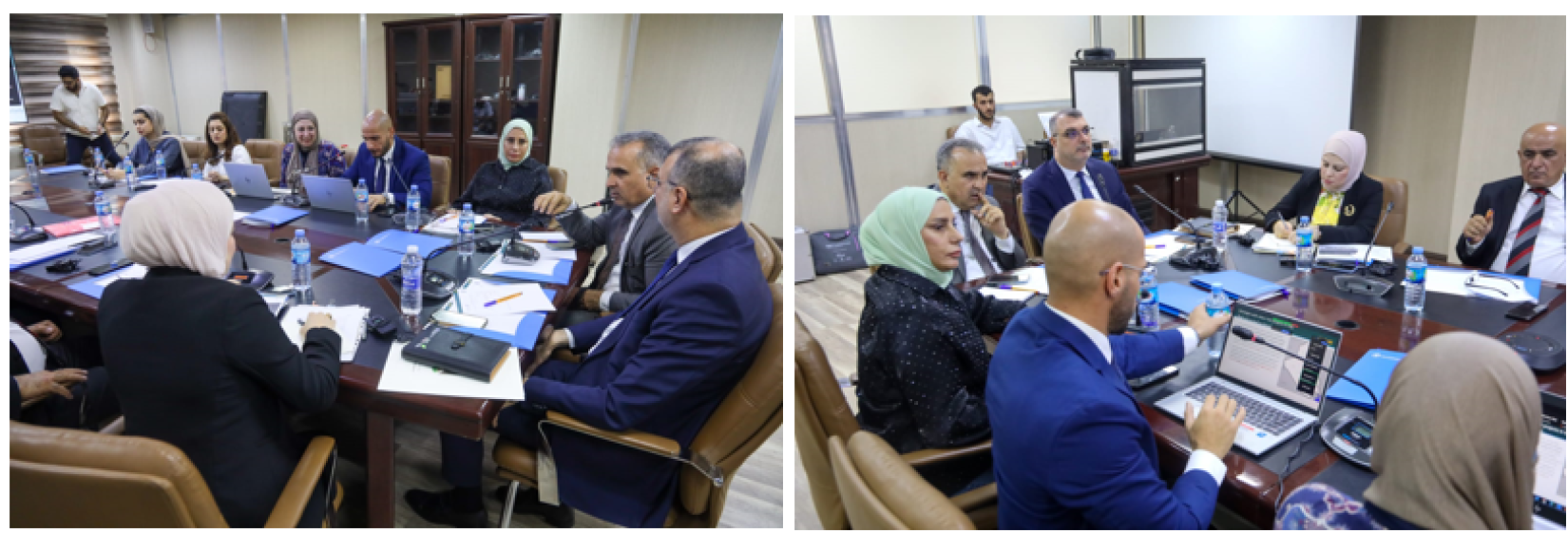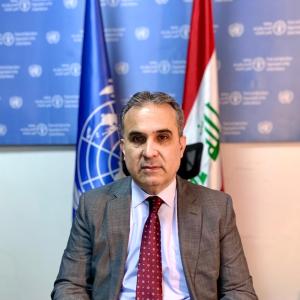FAO-WaPOR II project continues to develop capacities and increase technical follow-up
29 August 2024

Baghdad, August 29, 2024 - The Food and Agriculture Organization of the United Nations (FAO) in Iraq, in partnership with the Ministry of Water Resources, held the second steering committee meeting for the Land and Water Productivity Monitoring using Remote Sensing (WaPOR II) project funded by the Kingdom of the Netherlands at the Ministry’s premises in Baghdad.
The meeting was chaired by Dr. Hatem Hamid Hussein, Director General of the Planning and Follow-up Department at the Ministry of Water Resources, Dr. Salah ElHajj Hassan, FAO Representative in Iraq, and attended by representatives from Ministries of Agriculture, Planning, Environment, Higher Education and Scientific Research, Agriculture and Water Resources and planning in the Kurdistan Region of Iraq, and international partners from the IHE Delft Water Education Institute and the International Water Resources Management Institute (IWMI).
Dr. Hussein praised the importance of the data provided by the WaPOR platform, (the FAO Water Productivity Open-access portal), saying that the Ministry’s technicians have actually used this data to extract indicators and prepare reports that were approved by governmental decision-makers.
FAO representative stressed the importance of benefiting from the data of this platform, which allows comparing land and water productivity and other indicators spatially and temporally in different parts, such as irrigation project areas or at the river basin level, to assess the impacts of interventions and improve irrigation system operations and resource use efficiency.
The WaPOR project aims to help partner countries develop their capacities to monitor and improve water and agricultural land productivity, and thus respond to the challenges imposed by the increasing pressure on freshwater resources and the need to sustain agricultural production to ensure food security in the face of climate change.
FAO and project partners: IHE DELFT and IWMI, reviewed the activities carried out during 2023-2024 regarding capacity development to assess irrigation performance in the study areas of the West Gharraf Irrigation Project (Wasit and Thi Qar) and the Shamamuk Project in Erbil. The challenges facing the irrigation sector in Iraq and the added value provided by the project were also discussed, especially in increasing water efficiency use in the agricultural sector.
The SC concluded its meeting by emphasizing the sustainability of capacity building interventions and increasing the technical follow-up for the trained teams. The SC stressed also on technical team members’ commitment to the training programs to enable them to manage the WaPOR tool that will be hosted by the Ministry of Water Resources to monitor irrigation performance in the West Gharraf Irrigation Project area and the WaPOR tool that will be hosted by the Ministry of Agriculture and Water Resources in the Kurdistan Regional Government to monitor groundwater abstraction for agricultural purposes in the Shamamuk Irrigation Basin.
The training programs will also provide team members with the required ability to widely transfer knowledge, in addition to discussing the opportunities to expand the project framework of the two study areas.

He started his career in 1984, as Senior Research Assistant in the Agricultural Research and Education Centre (AREC), American University of Beirut. From 1987 to 1991, he was Coordinator of the Student Training Programme, and also Agriculture and Horticultural Teacher for the Faculty of Agriculture, at the Lebanese University.
From 1991 to 1995, he worked as Agricultural Engineer at the Ministry of Agriculture, Bekaa Regional Office, Zahlah and was then assigned to the Agricultural Research Institute in the Tal Amara station, first as Head of the Crop Production Department and subsequently in charge of the Plant Protection Laboratory. From 2002 to 2006, he was Director of the Kfardane Research Station (Agricultural Research Institute). In 2008, he became Visiting Scientist at the International Maize and Wheat Improvement Centre (CIMMYT) and Coordinator of a project with the International Centre for Atomic Energy Agency, Vienna.
In 2010, he served as Advisor to the Minister for Agriculture of Lebanon. In 2011, he became President of the Pesticide Scientific Committee, Head of the Phytoplasma Committee and Director of the Agriculture and Rural Development Programme (ARDP) (EU-funded project). From 2010 to 2013, he represented Lebanon in negotiations with EU, Egypt, Jordan and Iraq. During his career, Mr Hajj Hassan also carried out a number of other functions. He represented the Lebanese Agricultural Research Institute (LARI) in several research programmes with the International Centre for Agricultural Research in the Dry Areas (ICARDA) and the American University of Beirut. He was Coordinator of the Mashreq/Maghreb project with ICARDA, representing Lebanon in the Steering Committee, as well as being the Head of the Sugar-beet Delivery and of the Wheat Delivery Committees. For a number of years, Mr Hajj Hassan worked for the preparation of FAO TCP projects and served as the National Director of a TCP project. He joined FAO in January 2014 as FAO Representative in Yemen. Mr Hajj Hassan succeeds Mr El Zubi as FAO Representative in Iraq.



